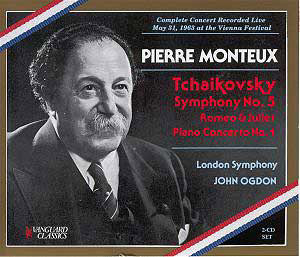Famously at the age of 86 Monteux became Chief Conductor
of the LSO. This was in 1961. His contract was for 25 years! The LSO
had returned to glory days under the tutelage of Antál Dorati
and Monteux’s reign inherited the resulting artistic-technical skills
and added to it an intuitive fire. This two CD set is proof positive
of the unanimity of the orchestra and sense of rightness whether in
mystery or howling climaxes; argent beauty or golden repose. This evening
concert (part of the LSO’s 1963 European tour) saw everyone ‘on song’.
Pierre Monteux died on 1 July 1964 thirteen months after this concert.
Vanguard-Omega owe it to Brenda Ogdon, the LSO and
Nancie Monteux-Barendse for permission for the release of these recordings.
The tapes had been lost in the radio archive and only resurfaced in
the early 1990s. To whom do we owe thanks for finding the misfiled tapes?
They sound superb. How many more audio documents of this stunning calibre
reside in radio archives the world over?
In Romeo and Juliet the deep harmonious strings
are generously sonorous with fathom-deep reach. The work is projected
with gripping, even frenzied, abandon. Think of Bakst’s wild corybantes
and you have some idea of the effect. Mravinsky might well have recognised
himself in this furious and intoxicating conflagration. Monteux all
the time retains a control which works just as well in romantic wash
as in celestial fortissimo. Who has built the great tension release
of the love theme as well as he (try 14.20). If this doesn’t raise the
hairs on the back of your neck I don’t know what will.
John Ogdon (1937-89) had recorded the Piano Concerto
with Barbirolli for EMI within twelve months before this concert. I
recall getting to know the work from an EMI cassette of that performance.
It never really caught fire. Here the Concerto too is taken explosively
although it is not the equal of Petukhov’s rampant live recording on
Pavane.
The Symphony, which takes up the entirety of the second
disc, coheres splendidly. Monteux’s hallmarks of small but superbly
balanced little accelerations and decelerations when you might least
expect it lend this staggering performance its unique quality. The skittering
scurrying of the strings at the start of the third movement are fresh
and draw on seemingly infinite reserves of sparkling energy. The muscle
and brawn of this recording has perhaps been won at the expense of some
of the front row to back row orchestral depth but you are unlikely to
even think of grumbling. Rozhdestvensky’s Brilliant Classics version
missed the celestial; spark, Mravinsky’s stereo DG version from 1960
was frenetic to the point of hysteria, Verbitsky’s surprising ABC version
was fine and level-headed but does not have the sledge-hammer ‘boot’
of this recording.
I had been remiss in largely ignoring Monteux until
now. Do not make the same mistake as this reviewer. Dr Mullenger you
can put me down for any Monteux that might be going in future. I shall
have to keep my eyes open for the RCA Victor Pierre Monteux Edition
on 09026 61893-2 (15 discs). This set issued in 1994, and long gone
under the deletions machete, included the last three numbered symphonies
with the San Francisco SO all issued on LP in 1959 and 1960.
Omega-Vanguard have a hall of fame recording on their
hands here. More people should know about it. This set deserves to stand
with Golovanov’s Francesca, Mravinsky’s Fourth Symphony, Svetlanov’s
Manfred, Petukhov’s Piano Concerto No. 1, Oistrakh’s BMG-Melodiya
Violin Concerto.
This is Tchaikovsky made anew, green in youth and with
the awe-inspiring capacity to astonish and delight. It represents a
precious gift in which to delight and this is delivered up in sound
that will leave you drooling for more. I wonder where this lost alchemical
artistry of recording is now to be found.
Rob Barnett
Information received
The good news is that the Tchaikovsky Symphony recordings
for RCA were all
made with the Boston Symphony. The best of the lot is the Pathetique,
one
of RCA's earliest stereo recordings from 1955. I believe that its success
led to the sessions for #s 4 and 5 in 1958 and 1959. The Fifth is not
quite as fine as the LSO on the Vanguard CD, but it does have vintage
BSO
sound. The Fourth is very good, but I think it is marred by a second
movement that is too brisk. Across all three symphonies, I think that
that
is Monteux's only questionable judgement.
Anthony Fast


